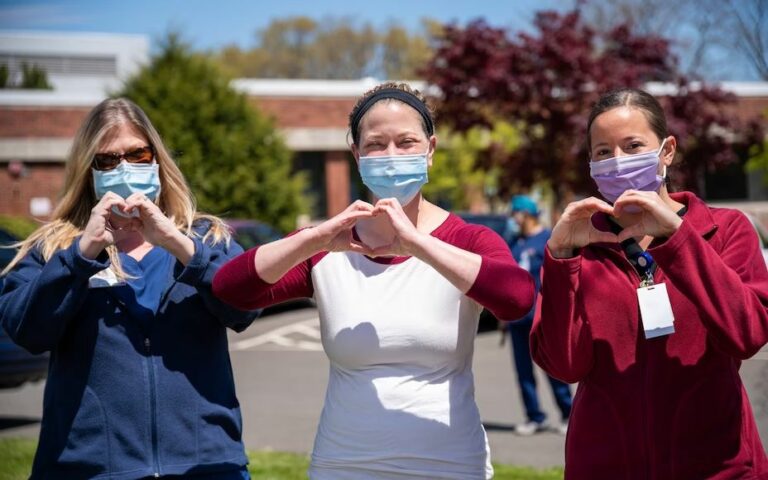Becoming a Family Nurse Practitioner (FNP) is a rewarding and fulfilling career path that requires a strong educational foundation. FNPs play a vital role in providing comprehensive healthcare services to individuals and families across diverse settings.
As per the statistics published on Zippia, currently, there are more than 211,221 employed FNPs across the country. Among various cities, New York, NY stands out as the area with the highest demand for FNPs.
In terms of compensation, San Francisco, CA offers the highest annual average wage for FNPs, reaching $123,303. These figures underscore the increasing significance of FNPs in addressing the healthcare requirements of communities nationwide.
In this article, we will explore the transformative journey from the classroom to the clinic and how education shapes Family Nurse Practitioners.
Basic Nursing Education
According to Wilkes University, nursing education serves as the bedrock for aspiring FNPs. It all starts with a firm grounding in nursing theory, practical skills, and critical thinking. Nursing students learn anatomy, pharmacology, physiology, and pathology during their undergraduate education. These fundamental courses provide the building blocks for advanced practice nursing.
However, as a post on Health Tech Zone points out, being a nurse is a difficult and rewarding career path that needs dedication, hard work, and a strong desire to serve others. The post also notes that an Associate’s Degree in Nursing (ADN), a Bachelor of Science in Nursing (BSN), and an accelerated Bachelor of Science in Nursing (ABSN) are all options for getting started on the path to becoming a nurse practitioner.
Advanced Practice Education
To become an FNP, nurses pursue advanced practice education at the master’s or doctoral level. This specialized training equips them with the necessary skills to provide primary care, diagnose illnesses, prescribe medications, and manage chronic conditions. Advanced practice programs focus on evidence-based practice, healthcare policy, advanced health assessment, and specialized clinical rotations.
In addition to traditional on-campus programs, aspiring FNPs now have the option to pursue their advanced practice education through Family Nurse Practitioner programs online. Online FNP programs offer flexibility and convenience, allowing registered nurses to continue their education while balancing work and personal commitments.
Bridging Theory and Practice
One of the most valuable aspects of FNP education is the integration of clinical rotations. These experiences allow students to apply theoretical knowledge in real-world healthcare settings.
Under the guidance of experienced preceptors, aspiring FNPs gain hands-on experience in assessing patients, developing care plans, and collaborating with multidisciplinary healthcare teams. These rotations provide valuable insights into the diverse needs and challenges faced by patients and families.
Tailoring the FNP Role
FNP programs often offer specializations or elective courses that allow students to focus on specific areas of interest within primary care. These options may include pediatrics, geriatrics, women’s health, mental health, or community health. By choosing these specialized courses, FNPs can deepen their expertise in specific populations or practice settings, further enhancing their ability to address the unique healthcare needs of their patients.
Collaborative Care
Collaboration and teamwork are essential components of effective healthcare delivery. FNP education emphasizes interprofessional education, promoting collaboration among different healthcare disciplines. Through interprofessional experiences, FNPs learn to work closely with physicians, pharmacists, social workers, and other healthcare professionals, fostering a holistic approach to patient care and ensuring comprehensive treatment plans.
Staying Relevant in a Changing Field
The journey to becoming an FNP does not end with graduation. Continuous learning is crucial in the ever-evolving field of healthcare.
According to a 2022 article by Psychreg, a recent American Association of Nurse Practitioners poll indicated that over 90% of nurse practitioners feel equipped to deliver primary care services. However, just 60% of nurse practitioners felt prepared to offer essential care to patients with chronic illnesses.
This is where professional development comes in. Professional development options can assist nurse practitioners in gaining the information and skills required to care for patients with chronic diseases.
FNPs are encouraged to engage in ongoing professional development, attend conferences, and stay abreast of the latest research and advancements in their specialty areas. This commitment to lifelong learning ensures that FNPs remain competent, informed, and equipped to provide high-quality care to their patients.
Final Word
In conclusion, the journey from the classroom to the clinic for Family Nurse Practitioners (FNPs) is a transformative one, shaped by a robust educational foundation. Starting with basic nursing education, which provides the fundamental knowledge and skills, FNPs then pursue advanced practice education to develop expertise in primary care.
The integration of clinical rotations bridges the gap between theory and practice, equipping FNPs with hands-on experience in real-world healthcare settings. Specializations and elective courses allow FNPs to tailor their roles to specific areas of interest, further enhancing their ability to meet the diverse healthcare needs of patients.
Collaboration and continuous professional development ensure that FNPs stay relevant in a changing field, delivering high-quality care to individuals and families across communities.
